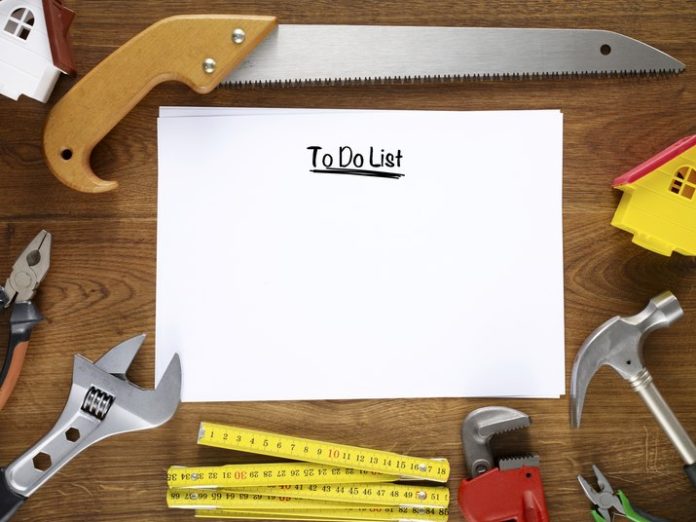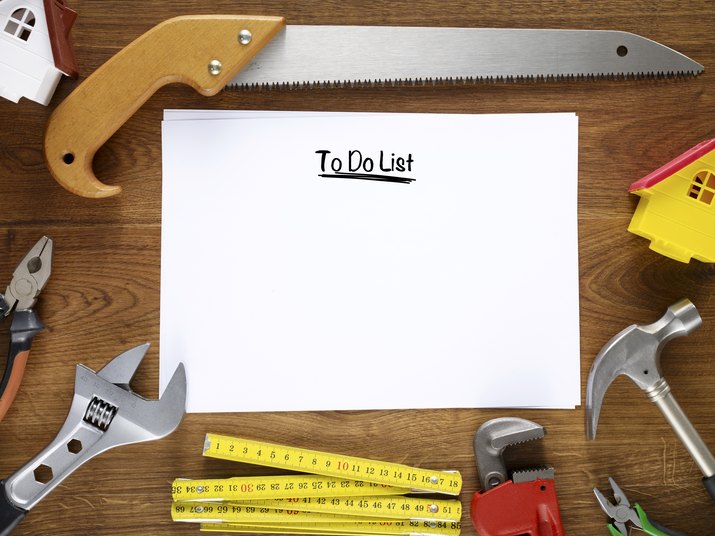
Your home may be your castle (as the saying goes) and your place of refuge, but keeping it in top condition requires endless rounds of cleaning and maintenance chores. While some are enjoyable in their own right, the sheer number of things that need attention "some day" can become overwhelming. To lighten the load a little, here are a few of our favorite tips to help you keep up with the upkeep.
gerenme/E+/GettyImages
1. Easy Carpet Maintenance
Even a relatively new carpet won't look its best if it develops a snag or a frayed spot. To mask those and keep your carpet looking newer for longer, trim the frayed area as well as you can with scissors and then apply a small amount of carpet adhesive as close to the carpet's backing as you can get it. Cover the spot with wax paper (to prevent sticking) and a heavy book and leave it for an hour or two. The snag will disappear. If you've moved your furniture and there are deep indentations left behind, leave ice cubes on the dents to melt. The carpet's fibers will swell as they absorb water, and the dents will disappear.
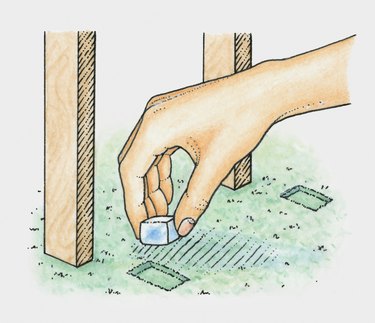 Easy hacks can keep your carpets looking good. Image Credit: Dorling Kindersley/Dorling Kindersley RF/GettyImages
Easy hacks can keep your carpets looking good. Image Credit: Dorling Kindersley/Dorling Kindersley RF/GettyImages
Video of the Day
2. Hide Dents and Dings on Wood
Getting dents out of hardwood flooring (or solid wood furniture for that matter) is also surprisingly simple. Wet the dented spot with a bit of water, cover it with a damp towel and press it with a hot iron as if you were getting the wrinkles out of your pants. Wiggle the iron around the towel to make sure the entire area is permeated with steam. The steam will expand the compressed fibers in the dented area, causing them to swell and leave the dent (nearly) invisible.
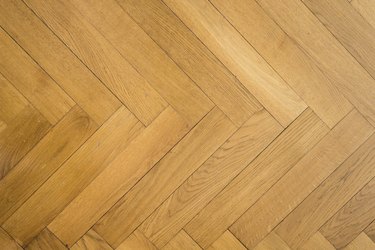 A damp cloth and a hot iron can minimize dents in wood flooring or furniture. Image Credit: EThamPhoto/Corbis/GettyImages
A damp cloth and a hot iron can minimize dents in wood flooring or furniture. Image Credit: EThamPhoto/Corbis/GettyImages
3. Zero-Effort Showerhead Cleaning
Most tap water contains dissolved minerals, and over time, those minerals can build up in the fine openings of your showerhead and interfere pretty badly with the quality of your shower. Replacing the showerhead is an option, of course, but it's cheaper and easier to clean the one you have. Just fill a plastic sandwich bag with white distilled vinegar and tie it onto your showerhead overnight. The vinegar will dissolve most of the buildup, restoring your water's flow. You may need to repeat the treatment if your showerhead is really clogged.
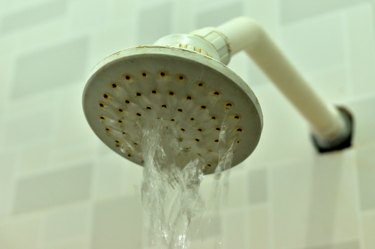 Dissolved minerals can interfere with the flow of water in your shower. Image Credit: Kuharong Busalae / EyeEm/EyeEm/GettyImages
Dissolved minerals can interfere with the flow of water in your shower. Image Credit: Kuharong Busalae / EyeEm/EyeEm/GettyImages
4. Improvised Lubricants for Sticky Situations
Much of home maintenance consists of making things stick when they should and keeping them from sticking when they shouldn't. For the second of those chores, common household items can be surprisingly helpful. For example, the graphite in a pencil lead can help unstick locks. Just scrape some lead with a knife and blow it into the lock. Then, work the key in and out a few times. For stuck drawers, doors or old-fashioned sash windows, rub the affected area a few times with a bar of soap. The soap will reduce friction and help things slide nicely.
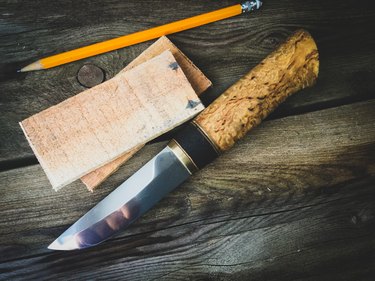 The graphite in a pencil lead makes a useful dry lubricant. Image Credit: Veselov Ivan / EyeEm/EyeEm/GettyImages
The graphite in a pencil lead makes a useful dry lubricant. Image Credit: Veselov Ivan / EyeEm/EyeEm/GettyImages
5. DIY Sink Drain Unclogger
Sink drains are relatively small and can easily clog up with hair or food waste. If that happens and you don't want to use harsh chemicals to clear the stoppage, you can improvise an unclogger with a few large zip ties. Just fasten three or four together end to end and then use a wire cutter or pocketknife to notch the edges and make them barbed. Slide your DIY clog tool down through the elbow of the sink and then pull it out, bringing the drain-clogging gunk with it.
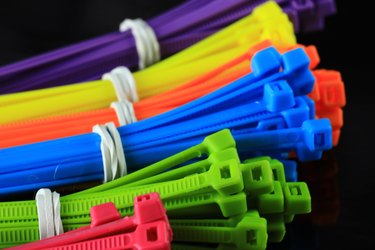 Use zip ties to make a DIY sink drain cleaner. Image Credit: Douglas Sacha/Moment/GettyImages
Use zip ties to make a DIY sink drain cleaner. Image Credit: Douglas Sacha/Moment/GettyImages
6. Use Kitty Litter for Oily Spills
Vehicles need maintenance just as much as homes do, and one unfortunate side effect is that you'll sometimes wind up with a spill of oil or oil-based fluids in your driveway or on your garage's floor. Those can be problematic to clean up, but if you're a cat owner, you already have the right tool on hand. Just sprinkle clean cat litter over the spill and allow it a little time to soak up the oil. The litter can be swept up and bagged and the last residue cleaned away relatively easily. This works for spilled cooking oil in the kitchen too.
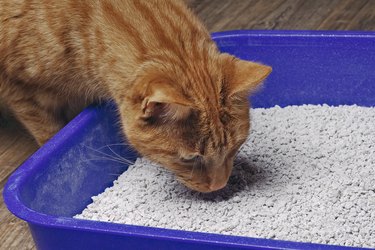 Cat litter works remarkably well for soaking up oily spills. Image Credit: Thorsten Nilson / EyeEm/EyeEm/GettyImages
Cat litter works remarkably well for soaking up oily spills. Image Credit: Thorsten Nilson / EyeEm/EyeEm/GettyImages
7. Tackle Humidity the Easy Way
If you live in an area where it's humid for all or part of the year, you'll know that humidity causes problems. A dehumidifier or good ventilation can help on the larger scale, but enclosed spaces, such as toolboxes and closets, are a separate problem. As it turns out, inexpensive chalk can come to the rescue. Place a handful of chalk in your toolbox or nail jar to prevent rust or hang a mesh bag of chalk in your closet to prevent mold and mustiness. To reuse the chalk, bake it in a low oven for an hour to drive out the absorbed moisture.
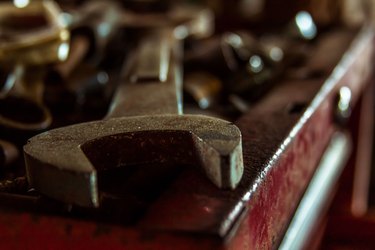 Chalk makes a convenient moisture absorber for enclosed spaces, like toolboxes. Image Credit: Oscar G Davila / EyeEm/EyeEm/GettyImages
Chalk makes a convenient moisture absorber for enclosed spaces, like toolboxes. Image Credit: Oscar G Davila / EyeEm/EyeEm/GettyImages
8. Pan Spray: Not Just for Pans
Nonstick pan spray is a kitchen staple, but it has some surprising applications around the home as well. If you spray your mower's underside and blades in spring, the pan spray will help keep grass from sticking. It works just as well for your snowblower in winter and for your garden spades and snow shovels in their respective seasons. Unlike most spray-on lubricants, it's not petroleum-based, so you can use it around kids, pets and growing things without worrying.
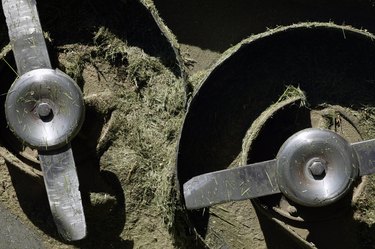 Pan spray can help keep grass or snow from sticking to tools. Image Credit: Comstock Images/Stockbyte/GettyImages
Pan spray can help keep grass or snow from sticking to tools. Image Credit: Comstock Images/Stockbyte/GettyImages
9. Use Painters' Tape for Professional-Looking Caulk Lines
Getting a clean, professional-looking caulk line around your tub, between tiles or along a window frame isn't as easy as it looks on TV. The simple truth is that most of us won't do this enough to get really good at it, which means we don't need to be sheepish about using a great little cheat: painters' tape. After you've cleaned and dried your work surface thoroughly, use painters' tape to mark off the area where you want your caulk line (it can be lifted off and straightened if necessary). After you run your bead of caulk and before it sets, strip off the tape to leave a clean, sharp-edged line.
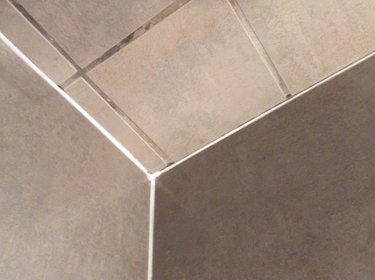 Getting a sharp, clean line isn’t always easy. Image Credit: Joey Kotfica/Photodisc/GettyImages
Getting a sharp, clean line isn’t always easy. Image Credit: Joey Kotfica/Photodisc/GettyImages
10. Use Automotive Supplies in Your Bathroom
Keeping your bathroom clean and shiny can be a real time sink, and scrubbing around tubs and tiles can be especially tiresome. To speed things, bring out the power tools. The automotive section of your local hardware store should sell a car-polishing attachment for your cordless drill in the form of a foam scrubbing pad. It works just as well on your tiles and tub surround and takes a lot less work than doing things by hand. While you're there, grab one of those products that makes water bead up and slide from your windshield. It will work just as well on your shower doors, keeping them cleaner for longer.
 Cut down on elbow grease by repurposing car-cleaning products. Image Credit: Lisa Werner/Moment Open/GettyImages
Cut down on elbow grease by repurposing car-cleaning products. Image Credit: Lisa Werner/Moment Open/GettyImages





























